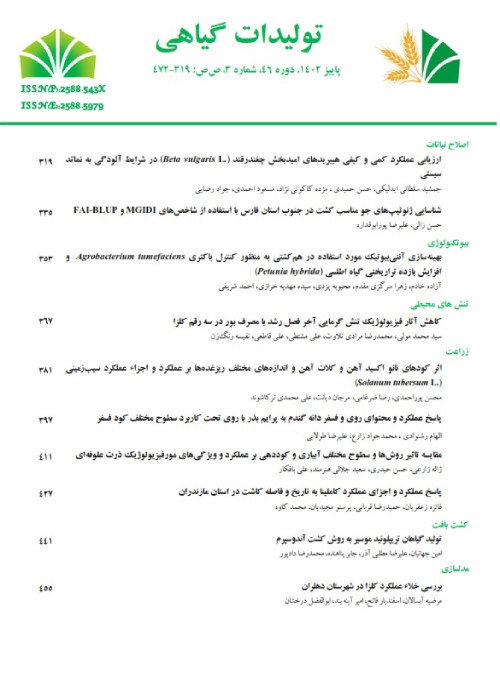Evaluative Effects of Brassinosteroid on Reduction of Harmful Effect of Chilling in Fruit Grape (Vitis vinifera L. Rishbaba) During Storage
Author(s):
Abstract:
Background And Objectives
Grapes are generally grown in different regions of Iran. Quality of table grapes is usually considered as a combination of appearance and flavor during shelf-life. Brassinosteroids are considered to be a class of plant polyhydroxysteroids and have been recognized as a new kind of phytohormones that play an essential role in plant development. Researchers studied the brassinosteroids levels in cucumber through a chemical genetics approach and found that BR levels were positively correlated with the tolerance to cold stresses. The objectives of this study were to evaluate the effects of BR on chilling d, lipid peroxidation content, and the induction of antioxidant enzymes, such as ascorbate peroxidase and superoxide dismutasein Rish Baba grape fruit during storage at 0-1 °C.Materials And Methods
Grape fruits were harvested and transported to the laboratory on the same day. The harvested fruits were washed, and dried in air. Grape fruits were treated with 0 (control), 0.75 and 1.5 milligram per liter brassinosteroid for 5 min and then stored at 0-1°C, 85-90 % relative humidity for 6 weeks. Characteristics such as chilling injury, ion leakage, lipid peroxidation, and activity of antioxidant enzymes were evaluated.Results
Results showed that brassinosteroid significantly reduced the chilling injury, ion leakage, lipid peroxidation and hydrogen peroxide, in treated fruits, compared to control. According to these results, pH and ascorbic acid of treated and controlled fruits increased during storage while titratable acidity of fruits decreased. As for brassinosteroid treatment, the pattern of mentioned changes reduced lower than control. So, the activity of antioxidant enzymes of fruits treated with brassinosteroid highly increased compared to control during storage. Fruits treated with 1.5 mgL-1 brassinosteroid showed the best effect with lowest chilling injury.Discussion
In the present study, the plant hormone BR was applied and the results indicated that BR significantly reduces CI of grape fruits during storage at 0-1 °C. Our finding was consistent with previous reports that exogenous application of BR is effective in protecting seedlings of rice, maize and cucumber against cold stress. CI occurrence is often accompanied by oxidative damage, which can be followed through lipid peroxidation content, since it is a final product of lipid peroxidation. In this study, there was a continuous increase in fresh tissue lipid peroxidation content in all fruits, but the application of BR significantly delayed the increase of lipid peroxidation. Moreover, the change in membrane permeability showed trends similar to lipid peroxidation content; that is, fresh tissue H2O2 content increased with storage duration, but BR markedly delayed the increase. BR has been considered to be involved in a network of interacting signal transduction pathways, which regulate defense responses to abiotic stress. When horticultural crops are exposed to severe abiotic stresses, including cold stress, large amounts of intracellular ROS are generated. The detoxification of ROS is dependent on antioxidant enzymes such as superoxide dismutase. The increase in these enzymes activity contributes to the adaptation of plants to cold stress and ameliorates oxidative damage such as lipid peroxidation and H2O2 content. Keywords:
Language:
Persian
Published:
Plant Production, Volume:39 Issue: 4, 2017
Pages:
65 to 78
https://magiran.com/p1642525
دانلود و مطالعه متن این مقاله با یکی از روشهای زیر امکان پذیر است:
اشتراک شخصی
با عضویت و پرداخت آنلاین حق اشتراک یکساله به مبلغ 1,390,000ريال میتوانید 70 عنوان مطلب دانلود کنید!
اشتراک سازمانی
به کتابخانه دانشگاه یا محل کار خود پیشنهاد کنید تا اشتراک سازمانی این پایگاه را برای دسترسی نامحدود همه کاربران به متن مطالب تهیه نمایند!
توجه!
- حق عضویت دریافتی صرف حمایت از نشریات عضو و نگهداری، تکمیل و توسعه مگیران میشود.
- پرداخت حق اشتراک و دانلود مقالات اجازه بازنشر آن در سایر رسانههای چاپی و دیجیتال را به کاربر نمیدهد.
In order to view content subscription is required
Personal subscription
Subscribe magiran.com for 70 € euros via PayPal and download 70 articles during a year.
Organization subscription
Please contact us to subscribe your university or library for unlimited access!



